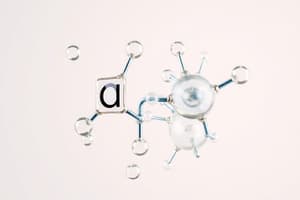Podcast
Questions and Answers
What type of chemical reaction involves the formation of a product from two or more simple substances?
What type of chemical reaction involves the formation of a product from two or more simple substances?
- Synthesis reaction (correct)
- Single-replacement reaction
- Decomposition reaction
- Double-replacement reaction
Why is balancing chemical equations important?
Why is balancing chemical equations important?
- To ensure the number of atoms on both sides of the equation is equal (correct)
- To increase the energy released in the reaction
- To speed up the reaction rate
- To change the nature of the reactants
Which type of chemical bond involves the sharing of electrons between atoms?
Which type of chemical bond involves the sharing of electrons between atoms?
- Hydrogen bond
- Covalent bond (correct)
- Ionic bond
- Polar covalent bond
In a decomposition reaction, what happens to the compound?
In a decomposition reaction, what happens to the compound?
Which chemical reaction involves two elements switching places in two compounds?
Which chemical reaction involves two elements switching places in two compounds?
What type of chemical bond results from the electrostatic attraction between positively and negatively charged ions?
What type of chemical bond results from the electrostatic attraction between positively and negatively charged ions?
Which subtopic of chemistry focuses on the different forms matter can take?
Which subtopic of chemistry focuses on the different forms matter can take?
What is the primary characteristic of a solid according to the text?
What is the primary characteristic of a solid according to the text?
How are acids and bases classified, according to their ionization properties?
How are acids and bases classified, according to their ionization properties?
Which chemical reaction involves the transfer of electrons between atoms?
Which chemical reaction involves the transfer of electrons between atoms?
What is used to measure the strength of acids and bases?
What is used to measure the strength of acids and bases?
Which state of matter completely fills its container and expands to fill available space?
Which state of matter completely fills its container and expands to fill available space?
Flashcards are hidden until you start studying
Study Notes
Exploring the World of Chemistry
Chemistry is a fascinating science that studies matter and the transformations it undergoes. In this exploration, we'll dive into some fundamental concepts of chemistry, including types of chemical reactions, balancing chemical equations, chemical bonding, acids and bases, and states of matter.
Chemical Reactions
Chemical reactions are processes in which substances interact to produce new substances, often accompanied by the release or absorption of energy. These reactions can be classified into several types:
- Synthesis (combination) reactions: Formation of a product from two or more simple substances.
- Decomposition reactions: Breakdown of a compound into simpler substances.
- Single-replacement reactions: A single element replaces another in a compound, forming two new substances.
- Double-replacement reactions: Two elements switch places in two compounds, forming two new compounds.
Balancing Chemical Equations
Balancing chemical equations is crucial for understanding reaction stoichiometry and ensuring that the number of atoms on both sides of the equation is equal. This process involves adjusting the coefficients placed in front of the chemical formulas to achieve balance.
Chemical Bonding
Chemical bonding is the force that holds atoms together in molecules and compounds. There are two main types of chemical bonds:
- Covalent bond: Occurs due to the sharing of electrons between atoms.
- Ionic bond: Formed through the transfer of electrons between atoms, creating positively and negatively charged ions.
Acids and Bases
Acids and bases are substances that can react with water to produce hydronium ions (H3O+) and hydroxide ions (OH-), respectively. The strength of acids and bases is measured using the pH scale, which ranges from 0 (strong acid) to 14 (strong base). Acids and bases can also be classified as strong or weak, depending on their ionization properties.
States of Matter
States of matter describe the different forms matter can take. The three primary states of matter are:
- Solids: Substances with a fixed shape and volume.
- Liquids: Substances with a fixed volume but lack a fixed shape.
- Gases: Substances that fill their container completely, have no fixed shape or volume, and expand to fill available space.
Solids, liquids, and gases can also exist in less common states, such as plasmas, supercritical fluids, and Bose-Einstein condensates.
These subtopics of chemistry provide a strong foundation for understanding the properties and behavior of matter, the transformations it undergoes, and the reactions that drive these changes.
Studying That Suits You
Use AI to generate personalized quizzes and flashcards to suit your learning preferences.




